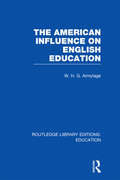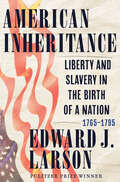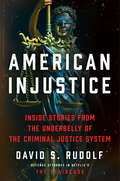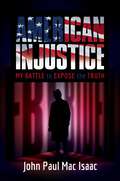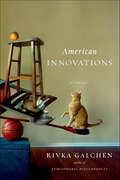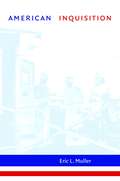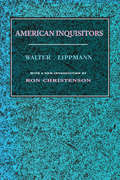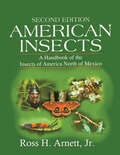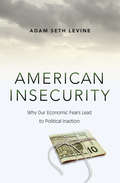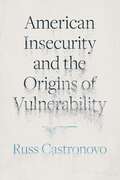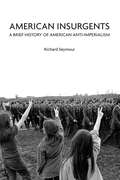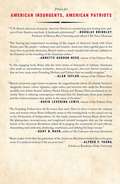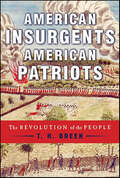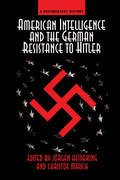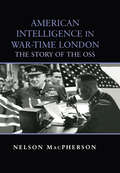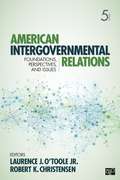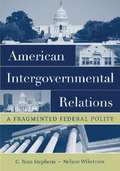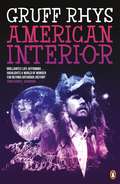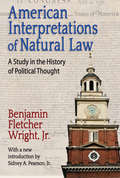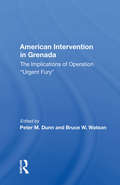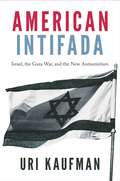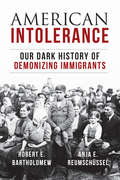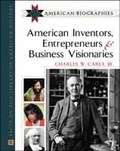- Table View
- List View
American Influence on English Education (Routledge Library Editions: Education)
by W H ArmytageThe American ideal has exercised a powerful influence over English educational policy over the last two centuries, even as it has itself changed. Today the very size of America enables it to rehearse problems we shall meet tomorrow. This volume answers key questions for education, as relevant now as they were when it was originally published: Is there an optimal size and a maximal use of a school? Are there adequately sophisticated batteries of attainment tests? Or valid methods of vocational guidance?
American Inheritance: Liberty and Slavery in the Birth of a Nation, 1765-1795
by Edward J. LarsonFrom a Pulitzer Prize winner, a powerful history that reveals how the twin strands of liberty and slavery were joined in the nation’s founding. New attention from historians and journalists is raising pointed questions about the founding period: was the American revolution waged to preserve slavery, and was the Constitution a pact with slavery or a landmark in the antislavery movement? Leaders of the founding who called for American liberty are scrutinized for enslaving Black people themselves: George Washington consistently refused to recognize the freedom of those who escaped his Mount Vernon plantation. And we have long needed a history of the founding that fully includes Black Americans in the Revolutionary protests, the war, and the debates over slavery and freedom that followed. We now have that history in Edward J. Larson’s insightful synthesis of the founding. With slavery thriving in Britain’s Caribbean empire and practiced in all of the American colonies, the independence movement’s calls for liberty proved narrow, though some Black observers and others made their full implications clear. In the war, both sides employed strategies to draw needed support from free and enslaved Blacks, whose responses varied by local conditions. By the time of the Constitutional Convention, a widening sectional divide shaped the fateful compromises over slavery that would prove disastrous in the coming decades. Larson’s narrative delivers poignant moments that deepen our understanding: we witness New York’s tumultuous welcome of Washington as liberator through the eyes of Daniel Payne, a Black man who had escaped enslavement at Mount Vernon two years before. Indeed, throughout Larson’s brilliant history it is the voices of Black Americans that prove the most convincing of all on the urgency of liberty.
American Injustice: Inside Stories from the Underbelly of the Criminal Justice System
by David S RudolfFrom the fearless defense attorney and civil rights lawyer who rose to fame with Netflix’s The Staircase comes a "stellar—and often shocking—report on a broken criminal justice system." (Kirkus, Starred Review)In the past thirty years alone, more than 2,800 innocent American prisoners – their combined sentences surpassing 25,000 years – have been exonerated and freed after being condemned for crimes they did not commit. Terrifyingly, this number represents only a fraction of the actual number of persons wrongfully accused and convicted over the same period. Renowned criminal defense and civil rights attorney David Rudolf has spent decades defending the wrongfully accused. In American Injustice, he draws from his years of experience in the American criminal legal system to shed light on the misconduct that exists at all levels of law enforcement and the tragic consequences that follow in its wake. Tracing these themes through the lens of some of his most important cases – including new details from the Michael Peterson trial made famous in The Staircase – Rudolf takes the reader inside crime scenes to examine forensic evidence left by perpetrators; revisits unsolved murders to detail how and why the true culprits were never prosecuted; reveals how confirmation bias leads police and prosecutors to employ tactics that make wrongful arrests and prosecutions more likely; and exposes how poverty and racism fundamentally distort the system.In American Injustice, Rudolf gives a voice to those who have been the victim of wrongful accusations and shows in the starkest terms the human impact of legal wrongdoing. Effortlessly blending gripping true crime reporting and searing observations on civil rights in America, American Injustice takes readers behind the scenes of a justice system in desperate need of reform.
American Injustice: My Battle to Expose the Truth
by John Paul Mac IsaacThis is the story of how I tried to get the Hunter Biden laptop evidence to the authorities.My life changed forever on April 12, 2019, when Hunter Biden stumbled into my shop requesting data recovery from one of his liquid-damaged laptops. After his father announced his candidacy for president of the United States, and Hunter failed to pay for and collect his computer, fear for my safety grew. There was paperwork in Hunter&’s possession giving me permission to examine and copy his data—someone was going to come looking for the laptop, and come looking for me. Concerned that I was sitting on evidence in a criminal investigation, I set out to hand everything over to the FBI. But, feeling betrayed by the FBI&’s inaction in providing the laptop as evidence during the impeachment trial, I then turned to Congress, and ultimately, to a lawyer for the president, Rudy Giuliani. When the story broke, Big Tech and social and mainstream media blocked the reporting. I was instantly labeled as a hacker and a criminal. My actions were labeled Russian disinformation, and it didn&’t take long before people started attacking my business and my character, forcing me to close my shop and flee the state.
American Innovations: Stories
by Rivka GalchenA BRILLIANT NEW COLLECTION OF SHORT STORIES FROM THE "CONSPICUOUSLY TALENTED" (TIME) RIVKA GALCHENWinner of the Danuta Gleed Literary Award A New York Times Book Review Notable BookChosen as one of fifteen remarkable books by women that are shaping the way we read and write in the 21st century by the book critics of The New York TimesIn one of the intensely imaginative stories in Rivka's Galchen's American Innovations, a young woman's furniture walks out on her. In another, the narrator feels compelled to promise to deliver a takeout order that has incorrectly been phoned in to her. In a third, the petty details of a property transaction illuminate the complicated pains and loves of a family. The tales in this groundbreaking collection are secretly in conversation with canonical stories, reimagined from the perspective of female characters. Just as Wallace Stevens's "Anecdote of the Jar" responds to John Keats's "Ode on a Grecian Urn," Galchen's "The Lost Order" covertly recapitulates James Thurber's "The Secret Life of Walter Mitty," while "The Region of Unlikeness" is a smoky and playful mirror to Jorge Luis Borges's "The Aleph." The title story, "American Innovations," revisits Nikolai Gogol's "The Nose." By turns realistic, fantastical, witty, and lyrical, these marvelously uneasy stories are deeply emotional and written in exuberant, pitch-perfect prose. Whether exploring the tensions in a mother-daughter relationship or the finer points of time travel, Galchen is a writer like none other today.
American Inquisition
by Eric L. MullerWhen the U.S. government forced 70,000 American citizens of Japanese ancestry into internment camps in 1942, it created administrative tribunals to pass judgment on who was loyal and who was disloyal. In American Inquisition, Eric Muller relates the untold story of exactly how military and civilian bureaucrats judged these tens of thousands of American citizens during wartime. Some citizens were deemed loyal and were freed, but one in four was declared disloyal to America and condemned to repressive segregation in the camps or barred from war-related jobs. Using cultural and religious affiliations as indicators of Americans' loyalties, the far-reaching bureaucratic decisions often reflected the agendas of the agencies that performed them rather than the actual allegiances or threats posed by the citizens being judged, Muller explains.American Inquisition is the only study of the Japanese American internment to examine the complex inner workings of the most draconian system of loyalty screening that the American government has ever deployed against its own citizens. At a time when our nation again finds itself beset by worries about an "enemy within" considered identifiable by race or religion, this volume offers crucial lessons from a recent and disastrous history.
American Inquisitors
by Walter LippmannAmerican Inquisitors is one of the small gems among Walter Lippmann's larger books. Written in response to the trials of John Scopes and William McAndrew in 1925 and 1927, this volume contains a succinct analysis of a basic problem of democracy: the conflict between intellectual freedom and majority rule. In both cases, the state, acting in the name of popular sovereignty, sought to suppress teaching that was contrary to the tenets of religious fundamentalism and patriotic tradition. In distilling the arguments surrounding both trials, Lippmann sounds a warning against the tyranny of the majority and challenges people to rethink their theories of liberty and democracy.American Inquisitors consists of five related dialogues, each exploring a different dilemma at the heart of democratic political theory. The first two establish the principles of majority rule and freedom of the mind in the persons of William Jennings Bryan and Thomas Jefferson, with Socrates urging a reexamination of all principles..These dialogues debate the will and the rational capacity of the people to rule and demonstrate the relative nature of freedom in democratic society.The third and fourth dialogues set a fundamentalist against a modernist and an Americanist against a scholar. Lippmann resists easy stereotyping and puts challenging insights and plausible arguments into the mouths of all the parties. These dialogues ask whether commitment to community comes before intellectual inquiry, 'or whether the search for truth precedes identity. The final dialogue, between Socrates and a conscientious teacher, attempts to define the mission of teaching and determine when and how to face the consequences of truth. Lippmann concludes that the program of liberty is to deprive the sovereign of absolute and arbitrary rule. Taken as a whole, the dialogues constitute an essential consistency within Lippmann's political thought, and delineate a recurring problem hi American politcal culture. American Inquisit
American Insects: A Handbook of the Insects of America North of Mexico, Second Edition
by Ross H. Arnett Jr.Offering a complete accounting of the insects of North America, this handbook is an up-dated edition of the first handbook ever compiled in the history of American entomology.By using American Insects, A Handbook of the Insects of America North of Mexico, Second Edition, readers can quickly determine the taxonomic position of any species, genus, or
American Insecurity
by Adam Seth LevineAmericans today face no shortage of threats to their financial well-being, such as job and retirement insecurity, health care costs, and spiraling college tuition. While one might expect that these concerns would motivate people to become more politically engaged on the issues, this often doesn't happen, and the resulting inaction carries consequences for political debates and public policy. Moving beyond previously studied barriers to political organization, American Insecurity sheds light on the public's inaction over economic insecurities by showing that the rhetoric surrounding these issues is actually self-undermining. By their nature, the very arguments intended to mobilize individuals--asking them to devote money or time to politics--remind citizens of their economic fears and personal constraints, leading to undermobilization and nonparticipation.Adam Seth Levine explains why the set of people who become politically active on financial insecurity issues is therefore quite narrow. When money is needed, only those who care about the issues but are not personally affected become involved. When time is needed, participation is limited to those not personally affected or those who are personally affected but outside of the labor force with time to spare. The latter explains why it is relatively easy to mobilize retirees on topics that reflect personal financial concerns, such as Social Security and Medicare. In general, however, when political representation requires a large group to make their case, economic insecurity threats are uniquely disadvantaged.Scrutinizing the foundations of political behavior, American Insecurity offers a new perspective on collective participation.
American Insecurity and the Origins of Vulnerability
by Russ CastronovoAn incisive critique that examines the origins of contemporary American ideas about surveillance, terrorism, and white supremacyFor more than three centuries, Americans have pursued strategies of security that routinely make them feel vulnerable, unsafe, and insecure. American Insecurity and the Origins of Vulnerability probes this paradox by examining American attachments to the terror of the sublime, the fear of uncertainty, and the anxieties produced by unending racial threat.Challenging conventional approaches that leave questions of security to policy experts, Russ Castronovo turns to literature, philosophy, and political theory to show how security provides an organizing principle for collective life in ways that both enhance freedom and limit it. His incisive critique ranges from frontier violence and white racial anxiety to insurgent Black print culture and other forms of early American terror, uncovering the hidden logic of insecurity that structures modern approaches to national defense, counterterrorism, cybersecurity, surveillance, and privacy. Drawing on examples from fiction, journalism, tracts, and pamphlets, Castronovo uncovers the deep affective attachments that Americans have had since the founding to the sources of fear and insecurity that make them feel unsafe.Timely and urgent, American Insecurity and the Origins of Vulnerability sheds critical light on how and why the fundamental political desire for security promotes unease alongside assurance and fixates on risk and danger while clamoring for safety.
American Insurgents
by Richard Seymour"Seymour's obsessively researched, impressive first book holds its place as the most authoritative historical analysis of its kind."--Resurgence All empires spin self-serving myths, and in the United States the most potent of these is that America is a force for democracy around the world. Yet there is a tradition of American anti-imperialism which gives the lie to this mythology. Richard Seymour examines this complex relationship from the Revolution to the present-day. Richard Seymour is a socialist writer and runs the blog Lenin's Tomb. He is the author of The Liberal Defense of Murder. His articles have appeared in the Guardian and New Statesman.
American Insurgents, American Patriots: The Revolution of the People
by T. H. BreenBefore there could be a revolution, there was a rebellion; before patriots, there were insurgents. Challenging and displacing decades of received wisdom, T. H. Breen's strikingly original book explains how ordinary Americans - most of them members of farm families living in small communities - were drawn into a successful insurgency against imperial authority. This is the compelling story of our national political origins that most Americans do not know. It is a story of rumor, charity, vengeance, and restraint. American Insurgents, American Patriotsreminds us that revolutions are violent events. They provoke passion and rage, a willingness to use violence to achieve political ends, a deep sense of betrayal, and a strong religious conviction that God expects an oppressed people to defend their rights. The American Revolution was no exception. A few celebrated figures in the Continental Congress do not make for a revolution. It requires tens of thousands of ordinary men and women willing to sacrifice, kill, and be killed. Breen not only gives the history of these ordinary Americans but, drawing upon a wealth of rarely seen documents, restores their primacy to American independence. Mobilizing two years before the Declaration of Independence, American insurgents in all thirteen colonies concluded that resistance to British oppression required organized violence against the state. They channeled popular rage through elected committees of safety and observation, which before 1776 were the heart of American resistance. American Insurgents, American Patriotsis the stunning account of their insurgency, without which there would have been no independent republic as we know it.
American Insurgents, American Patriots: The Revolution of the People
by T. H. BreenBefore there could be a revolution, there was a rebellion; before patriots, there were insurgents. Challenging and displacing decades of received wisdom, T. H. Breen's strikingly original book explains how ordinary Americans—most of them members of farm families living in small communities—were drawn into a successful insurgency against imperial authority. This is the compelling story of our national political origins that most Americans do not know. It is a story of rumor, charity, vengeance, and restraint. American Insurgents, American Patriots reminds us that revolutions are violent events. They provoke passion and rage, a willingness to use violence to achieve political ends, a deep sense of betrayal, and a strong religious conviction that God expects an oppressed people to defend their rights. The American Revolution was no exception. A few celebrated figures in the Continental Congress do not make for a revolution. It requires tens of thousands of ordinary men and women willing to sacrifice, kill, and be killed. Breen not only gives the history of these ordinary Americans but, drawing upon a wealth of rarely seen documents, restores their primacy to American independence. Mobilizing two years before the Declaration of Independence, American insurgents in all thirteen colonies concluded that resistance to British oppression required organized violence against the state. They channeled popular rage through elected committees of safety and observation, which before 1776 were the heart of American resistance. American Insurgents, American Patriots is the stunning account of their insurgency, without which there would have been no independent republic as we know it.
American Intelligence And The German Resistance: A Documentary History
by Jurgen HeidekingEven paranoids have enemies. Hitler's most powerful foes were the Allied powers, but he also feared internal conspiracies bent on overthrowing his malevolent regime. In fact, there was a small but significant internal resistance to the Nazi regime, and it did receive help from the outside world. Through recently declassified intelligence documents, this book reveals for the first time the complete story of America's wartime knowledge about, encouragement of, and secret collaboration with the German resistance to Hitler?including the famous July 20th plot to assassinate the Fuehrer.The U.S. government's secret contacts with the anti-Nazi resistance were conducted by the OSS, the World War II predecessor to the CIA. Highly sensitive intelligence reports recently released by the CIA make it evident that the U.S. government had vast knowledge of what was going on inside the Third Reich. For example, a capitulation offer to the western Allies under consideration by Count von Moltke in 1943 was thoroughly discussed within the U.S. government. And Allen Dulles, who was later to become head of the CIA, was well informed about the legendary plot of July 20th. In fact, these secret reports from inside Germany provide a well-rounded picture of German society, revealing the pro- or anti-Nazi attitudes of different social groups (workers, churches, the military, etc.). The newly released documents also show that scholars in the OSS, many of them recruited from ivy-league universities, looked for anti-Nazi movements and leaders to help create a democratic Germany after the war.Such intelligence gathering was a major task of the OSS. However, OSS director ?Wild Bill? Donovan and others favored subversive operations, spreading disinformation, and issuing propaganda. Unorthodox and often dangerous schemes were developed, including bogus ?resistance newspapers,? anti-Nazi letters and postcards distributed through the German postal service, sabotage, and fake radio broadcasts from ?German generals? calling for uprisings against the regime.This is much more than a documentary collection. Explanatory footnotes supply a wealth of background information for the reader, and a comprehensive introduction puts the documents into their wider historical perspective. Arranged in chronological order, these intelligence reports provide a fascinating new perspective on the story of the German resistance to Hitler and reveal an intriguing and previously unexplored aspect of America's war with Hitler.
American Intelligence in War-time London: The Story of the OSS
by Nelson MacPhersonBased on OSS records only recently released to US National Archives, and on evidence from British archival sources, this is a thoroughly researched study of the Office of Strategic Services in London. The OSS was a critical liaison and operational outpost for American intelligence during World War II. Dr MacPherson puts the activities of the OSS in
American Intergovernmental Relations
by Laurence J. O'Toole Robert K. ChristensenWith the addition of brand new co-editor, Robert Christensen, this trusted reader is back in a fresh and insightful fifth edition. To the general structure that has made American Intergovernmental Relations so enduring, the editors have added a new section that incorporates the importance of law and courts to intergovernmental relations. This new section explicitly grounds the study of intergovernmental relations to foundational Constitutional text and the dynamic role of the Supreme Court in interpreting constitutional powers. O'Toole and Christensen have also added new selections that cover society's current and most pressing intergovernmental policy issues, including health care, immigration, and the evolving and controversial issue of medical marijuana. As always, each essay is judiciously edited and substantial part introductions further contextualize each essay's contribution to make American Intergovernmental Relations an accessible and invaluable text, as well as an engaging read.
American Intergovernmental Relations: A Fragmented Federal Polity
by G. Ross Stephens Nelson WikstromThe one constant in the American federal system is change--change that is not always beneficial. American Intergovernmental Relations: A Fragmented Federal Polity examines how the dynamic social, economic, and political forces that impinge on American government at all levels shape the waythat our federal system functions. Stephens and Wikstrom--both senior scholars specializing in federalism, intergovernmental relations, and fiscal policy--offer concise, comprehensive, and easy-to-understand coverage of these materials. Beginning with the key elements of federalism, the authors trace these principles as they haveevolved since the founding of the republic and through the various phases and types of federal arrangements as they exist today. They examine and analyze the extreme complexity of the system and the cooperative and conflicting components of vertical and horizontal intergovernmental relations. Stephens and Wikstrom also discuss the impact of public policy and intergovernmental relations on American society in light of rising globalism, rapidly changing technology, and new security concerns. Featuring relevant case studies from the headlines, American Intergovernmental Relations is anideal text for undergraduate and graduate courses in federalism and intergovernmental relations. It is also an excellent text for a different approach to a course in American government.
American Intergovernmental Relations: Foundations, Perspectives and Issues (3rd edition)
by Laurence J. O'Toole Jr.Introduces classic essays and contemporary problems - all put in historic perspective by the editor's insightful and superb commentary. - From back cover
American Interior: The Quixotic Journey of John Evans
by Gruff RhysAmerican Interior is a psychedelic historical travelogue from Welsh pop legend Gruff Rhys.In 1792, John Evans, a twenty-two-year-old farmhand from Snowdonia, Wales, travelled to America to discover whether there was indeed, as widely believed, a tribe of Welsh-speaking native Americans still walking the great plains. In 2012, Gruff Rhys set out on an 'investigative concert tour' in the footsteps of John Evans, with concerts in New Orleans, Baltimore, Philadelphia, Pittsburgh, Cincinnati, St Louis, North Dakota and more. American Interior is the story of these journeys. It is also an exploration of how wild fantasies interact with hard history and how myth-making can inspire humans to partake in crazy, vain pursuits of glory, including exploration, war and the creative arts. Gruff Rhys is known around the world for his work as a solo artist as well as singer and songwriter with Super Furry Animals and Neon Neon, and for his collaborations with Gorillaz, Dangermouse, Sparklehorse, Mogwai and Simian Mobile Disco amongst others. The latest album by Neon Neon, Praxis Makes Perfect, based on the life of radical Italian publisher Giangiacomo Feltrinelli, was recently performed as an immersive live concert with National Theatre Wales.
American International Group - 2010
by Jay W. Lorsch Melissa BartonThe AIG Board underwent significant restructuring after the company was bailed out by the U.S. government in September 2008 in the midst of the financial crisis.
American Interpretations of Natural Law: A Study in the History of Political Thought (Library Of Liberal Thought Ser.)
by Benjamin Fletcher WrightThis book illustrates the deep roots of natural law doctrines in America's political culture. Originally published in 1931, the volume shows that American interpretations of natural law go to the philosophical heart of the American regime. The Declaration of Independence is the preeminent example of natural law in American political thought�it is the self-evident truth of American society.Benjamin Wright proposes that the decline of natural law as a guiding factor in American political behaviour is inevitable as America's democracy matures and broadens. What Wright also chronicled, inadvertently, was how the progressive critique of natural law has opened a rift between and among some of the ruling elites and large numbers of Americans who continue to accept it. Progressive elites who reject natural law do not share the same political culture as many of their fellow citizens.Wright's work is important because, as Leo Strauss and others have observed, the decline of natural law is a development that has not had a happy ending in other societies in the twentieth century. There is no reason to believe it will be different in the United States.
American Intervention In Grenada: The Implications Of Operation ""Urgent Fury""
by Peter M DunnWhy did the United States invade the sovereign state of Grenada in October 1983, risking world condemnation and the possible escalation of violence outside the borders of the tiny Caribbean island? According to the contributors to this book, the invasion-code-named "Urgent Fury"--was a product of the increasing concern with political instability in
American Intifada: Israel, the Gaza War and the New
by Uri KaufmanWhy are progressives so hostile to Israel?Listen to commentators and a pattern quickly emerges: the more liberal the speaker, the more likely they are to attack Israel. Worse, many liberals say things about Israel that are patently false. After the October 7 Hamas attack, Barack Obama said that Israel had &“unclean hands&” because of the &“unbearable occupation&”. The trouble was, there was no occupation. Israel had withdrawn from Gaza almost twenty years before. With his acclaimed wit, historian Uri Kaufman answers the riddle by examining the phenomenon through the distorting lens of race. Simply put, Israelis are perceived as a white group of privilege, while Palestinians are perceived as people of color. For progressives, fighting for people of color is the core value that crowds out all other considerations, no matter the facts. It all results in a strange upside-down world where liberals attack Israelis who share their values, while embracing Palestinians who reject them.
American Intolerance: Our Dark History of Demonizing Immigrants
by Robert E. Bartholomew Anja ReumschuesselThis historical review of the US treatment of immigrants and minority groups documents the suspicion and persecution that often met newcomers and those perceived to be different.Contrary to popular belief, the poor and huddled masses were never welcome in America. Though the engraving on the base of the Statue of Liberty makes that claim, history reveals a far less-welcoming message. This comprehensive survey of cultural and racial exclusion in the United States examines the legacy of hostility toward immigrants over two centuries. The authors document abuses against Catholics in the early 19th century in response to the influx of German and Irish immigrants; hostility against Mexicans throughout the Southwest, where signs in bars and restaurants read, "No Dogs, No Negros, No Mexicans"; "yellow peril" fears leading to a ban on Chinese immigration for ten years; punitive measures against Native Americans traditions, which became punishable by fines and hard labor; the persecution of German Americans during World War I and Japanese Americans during World War II; the refusal to admit Jewish refugees of the Holocaust; and the ongoing legacy of mistreating African Americans from slavery to the injustices of the present day.Though the authors note that the United States has accepted tens of millions of immigrants during its relatively short existence, its troubling history of persecution is often overlooked. President Donald Trump's targeting of Muslim and Mexican immigrants is just the most recent chapter in a long, sad history of social panics about "evil" foreigners who are made scapegoats due to their ethnicity or religious beliefs.
American Inventors, Entrepreneurs, and Business Visionaries
by Charles W. CareyFaced with limiting his coverage to less than 300 people, Carey (US history and western civilization, Lynchburg College and Central Virginia Community College) had little trouble including the famous figures that would be expected in such an account. After that, he strove to represent all categories of American life in order to demonstrate that people from all backgrounds have been and therefore can be successful innovators and visionaries in business. Annotation c. Book News, Inc., Portland, OR (booknews.com)
